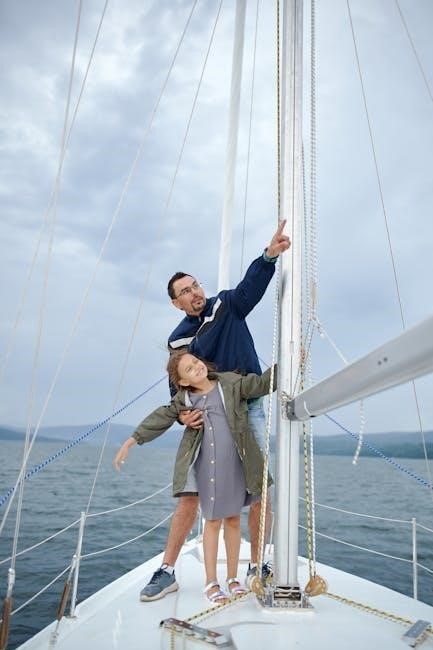
Sleepaway camps offer children unique experiences‚ combining adventure‚ learning‚ and social growth․ For parents‚ understanding camp dynamics is crucial‚ especially when films like Sleepaway Camp 2 spark concerns about content suitability and guidance needs․
What Are Sleepaway Camps?
Sleepaway camps are residential programs where children spend extended periods‚ often several days or weeks‚ engaging in outdoor activities‚ team sports‚ and creative projects․ These camps provide a structured environment away from home‚ fostering independence‚ self-reliance‚ and social skills․ Camps vary in focus‚ offering options like adventure‚ arts‚ sports‚ or STEM․ Many‚ such as Camp Cullen with the YMCA of Greater Houston‚ emphasize character development and teamwork․ Parents often view sleepaway camps as opportunities for their children to build confidence and form lasting friendships․ The experience allows kids to disconnect from technology and reconnect with nature‚ while learning valuable life skills․ For families considering sleepaway camps‚ understanding the camp’s mission‚ safety protocols‚ and activities is essential to ensuring a positive experience for their child․ Sleepaway camps are a timeless tradition for many‚ offering growth and memorable experiences․
Benefits of Sleepaway Camps for Children
Sleepaway camps provide children with unique opportunities for growth‚ fostering independence‚ resilience‚ and self-confidence․ Away from home‚ kids learn to manage daily tasks and make decisions‚ reducing reliance on parents․ These camps encourage teamwork and cooperation through group activities‚ helping children build strong social skills and lasting friendships․ Exposure to diverse environments and challenges promotes adaptability and problem-solving abilities․ Many camps offer a range of activities‚ from sports to arts‚ allowing children to explore new interests and talents․ Sleepaway camps also help children develop emotional intelligence‚ as they navigate homesickness and learn to communicate effectively with peers and counselors․ The experience often leads to improved academic performance and a greater sense of responsibility․ Overall‚ sleepaway camps are a transformative experience that equips children with essential life skills‚ preparing them for future challenges․
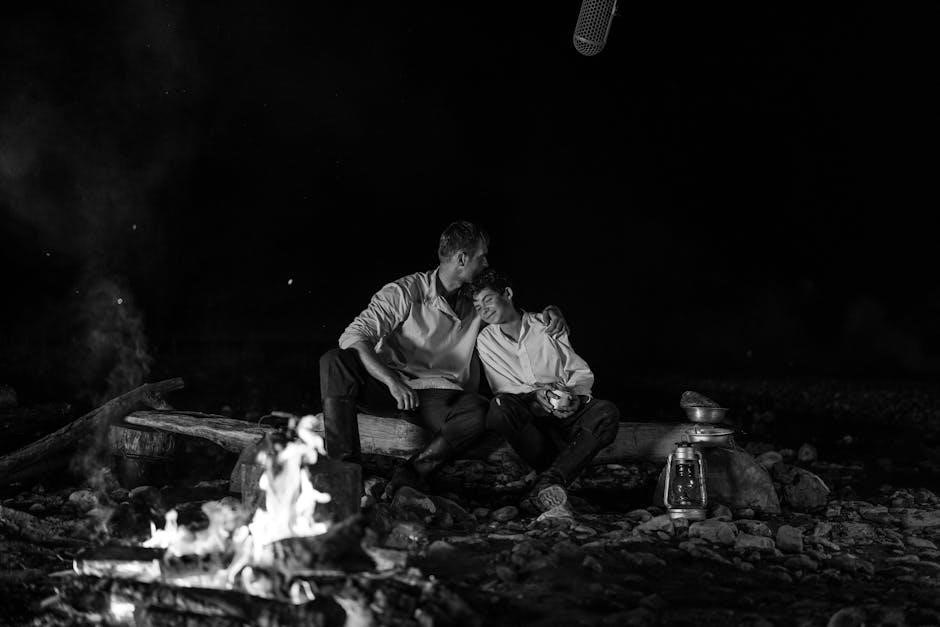
Sleepaway Camp 2 Overview
Sleepaway Camp 2‚ released in 1988‚ is a cult classic horror film directed by Michael A․ Simpson․ It stars Pamela Springsteen as Angela Baker‚ continuing the series’ dark legacy with its unique blend of violence and dark humor‚ making it a memorable sequel in the franchise․
A Brief History of Sleepaway Camp 2
Sleepaway Camp 2: Unhappy Campers‚ released in 1988‚ is the sequel to the 1983 original․ Directed by Michael A․ Simpson‚ the film continues the story of Angela Baker‚ now played by Pamela Springsteen‚ as she terrorizes a new group of campers․ The movie maintains the slasher genre’s hallmark violence and dark humor‚ while expanding on Angela’s backstory․ Set five years after the first film‚ Sleepaway Camp 2 introduces a fresh setting and characters‚ blending horror with campy charm․ Its over-the-top performances and gory scenes have earned it a cult following․ Despite mixed reviews‚ the film remains a standout in the horror genre for its eccentric style and memorable antagonist․ The sequel’s success solidified the franchise’s place in horror history‚ with fans appreciating its unique blend of humor and terror․
Why Sleepaway Camp 2 Is a Topic of Interest for Parents
Sleepaway Camp 2 sparks parental interest due to its graphic violence‚ nudity‚ and mature themes‚ making it a concern for families․ The film’s content includes explicit scenes‚ prompting parents to evaluate its suitability for children․ Its cult following and horror elements raise questions about its influence on young viewers․ Additionally‚ the movie’s portrayal of camp life‚ albeit fictional and exaggerated‚ encourages parents to reflect on real-life camp safety and their children’s readiness for such experiences․ The film serves as a conversation starter about media sensitivity and the importance of parental guidance in choosing appropriate entertainment․ Parents may also relate to the challenges of balancing freedom and protection for their children‚ as depicted in the film’s extreme scenarios․
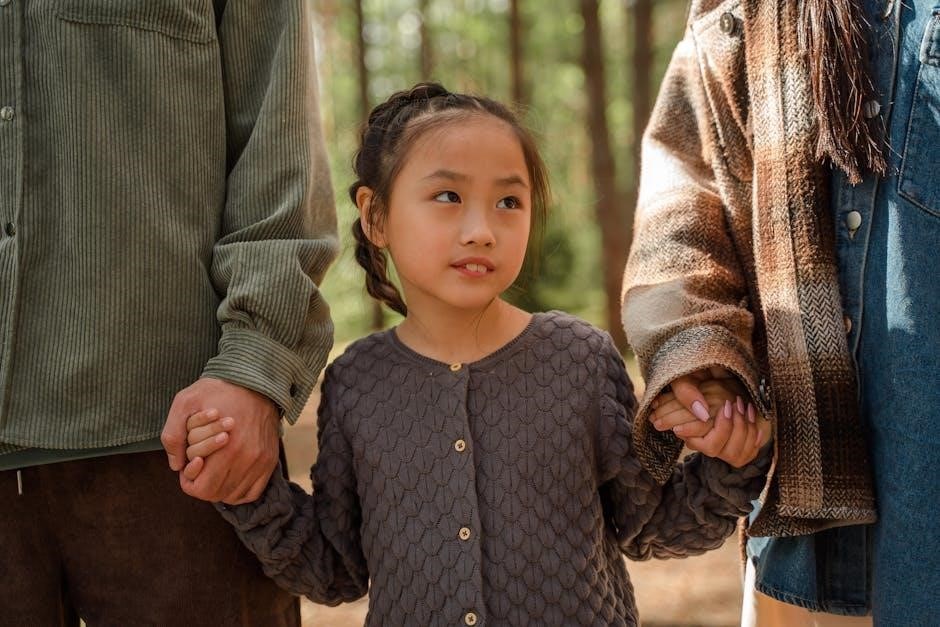
Content and Themes in Sleepaway Camp 2
The film features graphic violence‚ gore‚ and explicit nudity‚ making it unsuitable for young audiences․ Themes include slasher horror‚ mature sexuality‚ and dark humor‚ raising concerns for parents․
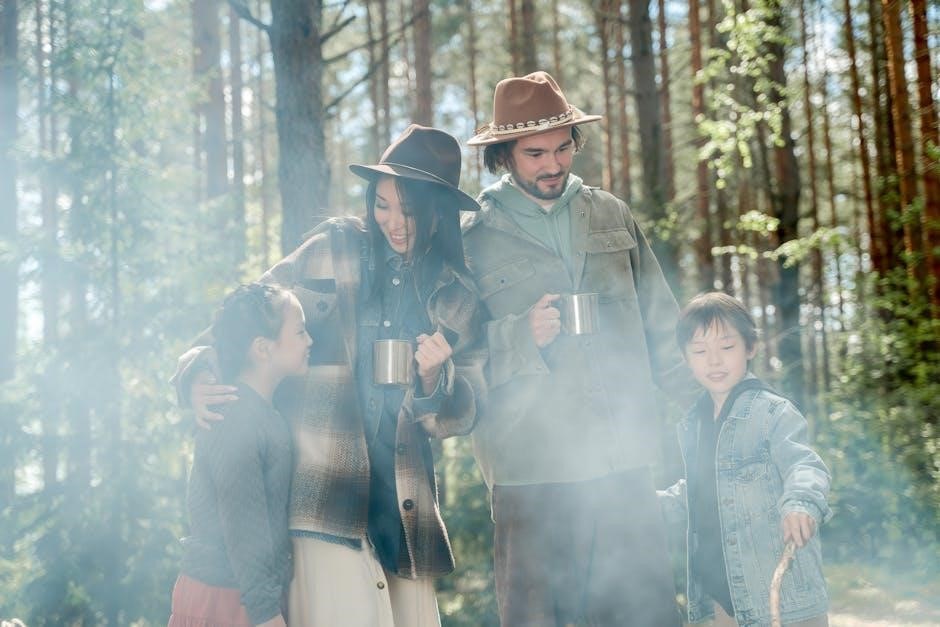
Violence and Gore in the Movie
Sleepaway Camp 2: Unhappy Campers is notorious for its graphic violence and extreme gore․ The film features brutal killings‚ with characters meeting grisly ends through various methods․ Scenes are often prolonged‚ emphasizing the carnage‚ which may disturb young viewers․ The slasher elements are central to the plot‚ making it unsuitable for children․ Parents should be aware of the explicit nature of these scenes‚ as they can be deeply unsettling․ The violence is not only physical but also psychological‚ adding to the film’s intense atmosphere․ This content raises concerns about exposure to such material for impressionable audiences‚ highlighting the need for parental discretion․
Nudity and Sexuality in the Film
Sleepaway Camp 2: Unhappy Campers contains explicit nudity and sexual content‚ which are significant concerns for parents․ The film features scenes with full frontal nudity‚ involving both male and female characters‚ often in the context of a nudist camp setting․ These scenes are prolonged and graphic‚ showcasing bare breasts‚ buttocks‚ and genitalia․ Additionally‚ there are sex scenes‚ including a depiction of a teenage couple engaging in intercourse in the woods․ The sexuality is portrayed in a manner that may be deemed inappropriate for younger audiences․ Parents should be aware of these elements when deciding if the film is suitable for their children․ The explicit nature of the content underscores the importance of parental guidance and discretion․
MPAA Rating and What It Means for Parents
Sleepaway Camp 2: Unhappy Campers has received an R-rating from the MPAA for violence‚ nudity‚ and sexuality․ This rating indicates that the film contains content deemed inappropriate for children under the age of 17 unless accompanied by a parent or guardian․ Parents should be aware that the movie includes graphic violence‚ explicit nudity‚ and sexual scenes‚ which may not align with all family values․ The R-rating serves as a guide to help parents make informed decisions about whether the film is suitable for their child․ It is essential for parents to review the content and consider their child’s maturity level before allowing them to watch․ This rating system is a valuable tool for families to navigate media choices responsibly․
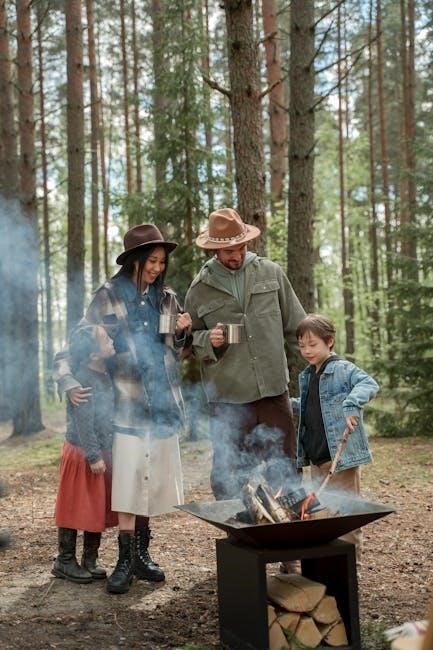
Practical Tips for Parents
Preparing children for sleepaway camp involves addressing homesickness‚ ensuring proper communication with counselors‚ and fostering independence․ These strategies help create a positive camp experience for kids;
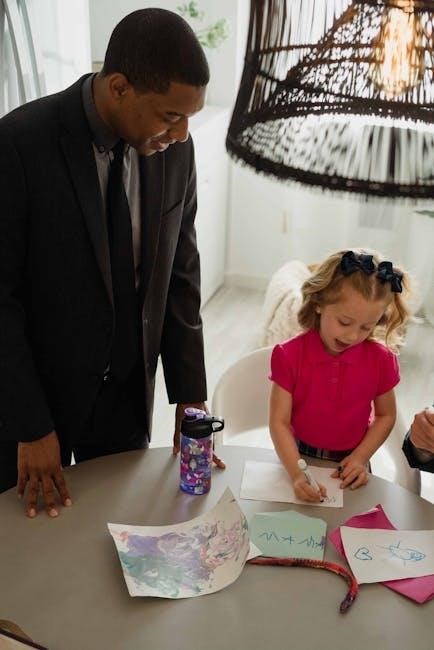
How to Prepare Your Child for Sleepaway Camp
Preparing your child for sleepaway camp involves open communication‚ practical steps‚ and emotional support․ Start by discussing camp activities‚ routines‚ and expectations to build excitement and reduce anxiety․ Involve your child in packing essentials like clothing‚ toiletries‚ and comfort items to foster a sense of responsibility․ Address homesickness by encouraging independence and reassuring them it’s okay to feel homesick․ Role-play scenarios to help them practice problem-solving and social skills․ Stay positive and emphasize the growth opportunities camp provides․ Finally‚ review the camp’s communication policies to ensure you’re both prepared for staying in touch․ These steps help create a smooth transition for your child’s camp experience․
Understanding and Addressing Homesickness
Homesickness is a common challenge for children at sleepaway camps‚ often triggered by unfamiliar surroundings and separation from family․ Parents can help by fostering open conversations beforehand‚ allowing their child to express feelings without judgment․ Reassure them that homesickness is normal and temporary‚ emphasizing their ability to cope․ Encourage independence by discussing problem-solving strategies and highlighting camp adventures․ Small comfort items‚ like a favorite blanket or photo‚ can provide reassurance․ Stay positive during drop-off to avoid reinforcing anxiety․ If homesickness arises‚ communicate with camp counselors for support․ Their expertise can help your child navigate emotions and build resilience․ Addressing homesickness proactively fosters confidence and ensures a positive camp experience for your child․
Communicating with Camp Counselors and Staff
Effective communication with camp counselors and staff is vital for ensuring your child’s well-being at sleepaway camp․ Before camp begins‚ ask questions about policies‚ safety measures‚ and how homesickness is handled․ Establish a clear line of communication to stay updated on your child’s experiences․ Many camps provide regular updates through emails‚ newsletters‚ or online portals․ If concerns arise‚ reach out promptly to discuss solutions․ Building trust with counselors ensures your child receives the support they need․ After camp‚ follow up with staff to gather insights and feedback‚ which can be invaluable for future planning․ Open and consistent communication fosters a positive environment for your child to thrive during their camp journey․
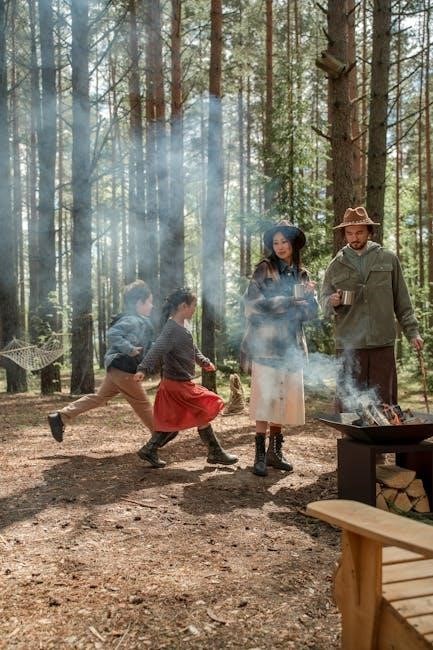
Choosing the Right Camp
Selecting the right sleepaway camp involves evaluating factors like safety‚ activities‚ and staff qualifications․ Research camp policies‚ reviews‚ and ask questions to ensure it aligns with your child’s needs and your expectations․ Utilize resources like checklists and guides to make an informed decision‚ ensuring a positive experience for your child․
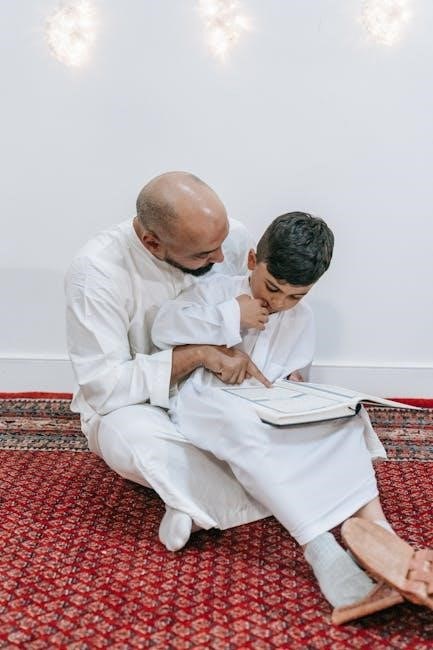
Questions to Ask When Selecting a Sleepaway Camp
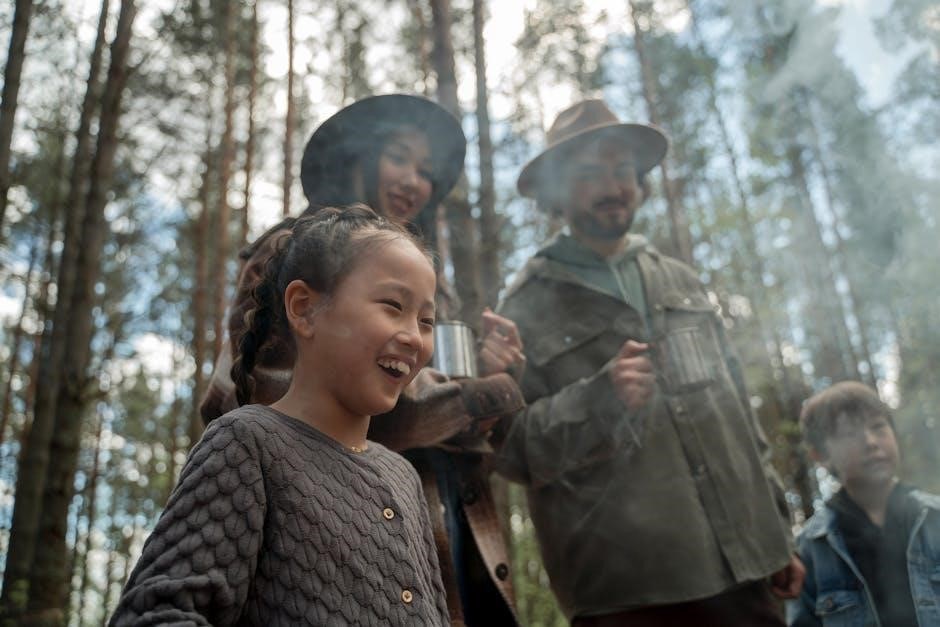
When choosing a sleepaway camp‚ parents should ask detailed questions to ensure it meets their child’s needs․ Inquire about camp policies‚ safety measures‚ and staff qualifications․ Ask about the camper-to-counselor ratio‚ emergency protocols‚ and how homesickness is addressed․ Understand the camp’s philosophy‚ activities offered‚ and inclusion policies․ Check if the camp is accredited by recognized organizations‚ such as the American Camp Association (ACA)․ Request references from other parents and ask about communication policies‚ including how updates are shared․ Additionally‚ inquire about health and medical care availability‚ dietary options‚ and how behavioral issues are handled․ Ensuring the camp aligns with your child’s interests and your expectations is crucial for a positive experience․
Ensuring Camp Safety and Security
Ensuring camp safety and security is paramount for parents․ Research the camp’s safety record and verify its accreditation by reputable organizations like the American Camp Association (ACA)․ Check if staff undergo thorough background checks and receive training in first aid‚ CPR‚ and emergency response․ Inquire about supervision policies‚ especially during activities‚ and how the camp handles medical emergencies․ Visit the facility to assess cleanliness‚ equipment safety‚ and the presence of security measures․ Understand the camp’s protocols for preventing and addressing bullying‚ and ensure they have clear communication channels for emergencies․ Transparency from camp leadership about safety practices is essential for building trust and ensuring your child’s well-being․ Always request references and speak with other parents to gain insights into the camp’s safety culture․
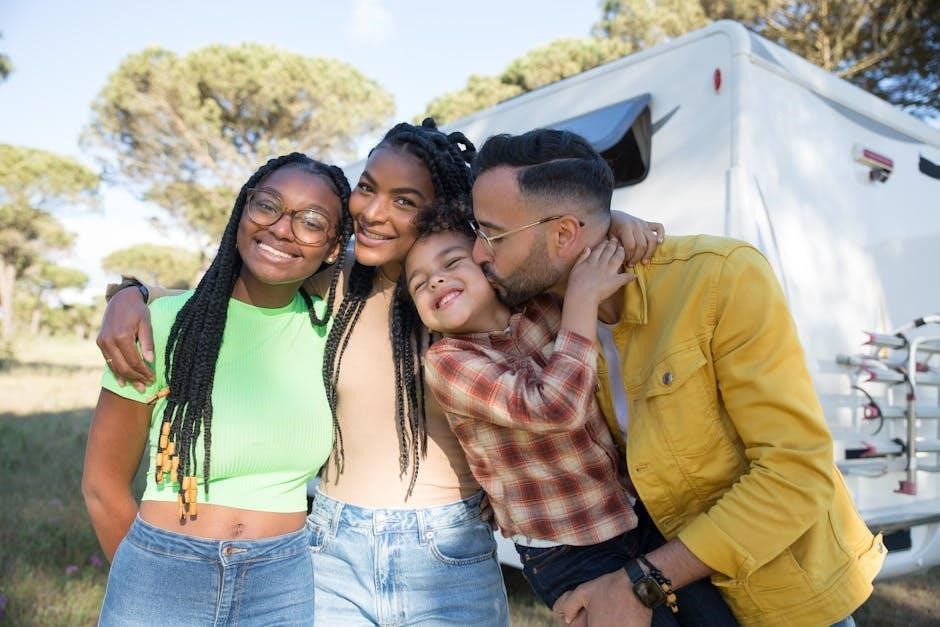
Additional Resources
Explore handbooks‚ online communities‚ and websites like Kids-In-Mind․com for detailed guides and support․ These resources offer insights into camp safety‚ reviews‚ and parenting tips․
Recommended Reading for Parents
Parents can benefit from guides like the Camp Cullen Handbook by YMCA of Greater Houston‚ offering insights into camp safety‚ health policies‚ and communication strategies․ Books on summer camp preparation provide tips on addressing homesickness and fostering independence․ Online resources such as Kids-In-Mind․com offer detailed content analyses of films like Sleepaway Camp 2‚ helping parents assess suitability․ Additionally‚ blogs and forums where parents share experiences can offer practical advice․ Checklists for packing and emotional readiness are also invaluable․ These resources empower parents to make informed decisions‚ ensuring a positive camp experience for their children while addressing concerns related to movies and camp life․
Online Resources and Support Communities
Parents seeking guidance on sleepaway camps can explore online resources like the YMCA of Greater Houston website‚ which offers detailed camp information․ Websites such as Kids-In-Mind;com provide content analyses of films like Sleepaway Camp 2‚ helping parents assess suitability․ Additionally‚ forums and social media groups dedicated to summer camps allow parents to share experiences and advice․ Blogs often feature tips on preparing children for camp‚ addressing homesickness‚ and understanding camp policies․ Online communities also offer support for parents navigating concerns about camp safety and their child’s readiness․ These digital platforms serve as invaluable tools for informed decision-making and emotional support throughout the camp selection and preparation process․
Sleepaway camps offer growth opportunities for children‚ while films like Sleepaway Camp 2 remind parents to stay informed about content and guide their kids responsibly․
Final Thoughts on Sleepaway Camps and Parental Guidance
Sleepaway camps provide children with invaluable experiences‚ fostering independence and confidence․ Parents should research camps thoroughly‚ ensuring they align with their child’s needs and values․ Guidance is key‚ especially when addressing concerns like those raised by Sleepaway Camp 2‚ which highlights the importance of understanding camp environments and content․ By staying informed and communicating openly‚ parents can help their children navigate camp life successfully․ Balancing trust and oversight ensures a positive experience for both kids and families‚ promoting personal growth and lasting memories․